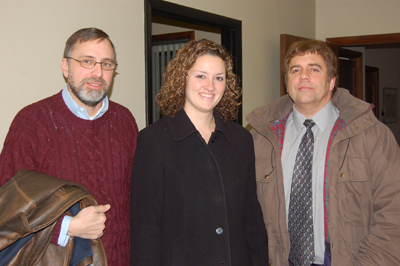

by Judy Alexander
Not so long ago, “Christian fiction” seemed to be code for low-caliber writing with cardboard characters, formulaic plots, and a heavy-handed salvation-through-accepting-Jesus message. Although this stereotyping may have always been unfair (what about C.S. Lewis?), it is even less valid today, as Christian fiction undergoes a transformation that is taking it out of the “Christian ghetto” and into the hands of mainstream readers.
This change is due to a larger selection of high-quality writing with realistic themes as well as greater distribution within the mainstream market.
Higher Quality Writing

Steve Barclift (pictured above on left, with Dennis
Hillman and Amy Stephansen of Kregel Publications), editor at Kregel Publications, says, “It’s
true that in the past, much of Christian fiction was formulaic and lacked
realism.” Now, themes include edgier issues, such as infidelity
or AIDS.
“We have a larger pool of talented writers,” adds Dennis Hillman, Kregel publisher. “They take writing quality very seriously.” As an example, he sites Liz Curtis Higgs, a great storyteller and speaker, who wrote Bad Girls of the Bible.
“Christian fiction is doing well,” says Amy Stephansen, Kregel’s head of marketing, who notes that sappy romances are no longer the norm.
Hillman lists some of the most popular contemporary Christian fiction writers: Karen Kingsbury, Lori Copeland, and Janette Oke. They are following the trail blazed in the 1960s by Grace Livingston Hill and Catherine Marshall.
He notes that the Christy Awards, begun eight years ago, encourage continued advances in the quality of Christian fiction by recognizing excellence in writing.
Distribution Beyond Christian Bookstores
With the success of Jan Karon’s Mitford books and the Left Behind series, mainstream booksellers see potential profits in “religious fiction.” Now, Barnes & Noble has a section in each store devoted solely to this category.
Despite the fact that the primary sales channel for Christian fiction, the independent Christian bookstore, has lost market share to mass markets and chain stores, publishers of Christian fiction have experienced sales growth.
“Amazon changed the playing field,” says Hillman. “Now Christian publishers can deliver their books to anyone’s home. This has broadened our readership base.”
Future Challenges
The challenge for Christian writing will be to reach a younger audience, according to Barclift. “The writing will need to be grittier and deal with real-life struggles.” One writer doing this, using the essay form, is Donald Miller, author of Blue Like Jazz.
“Fiction needs credibility and characters you care about,” says Barclift. He points to new author Judy Alexander, whose novel Desert Medicine will be published in November 2007. He adds: “Her writing deals with real-life mistakes and struggles.”
To find out more about the state of Christian fiction, read a recent article in ForeWord Magazine.
.